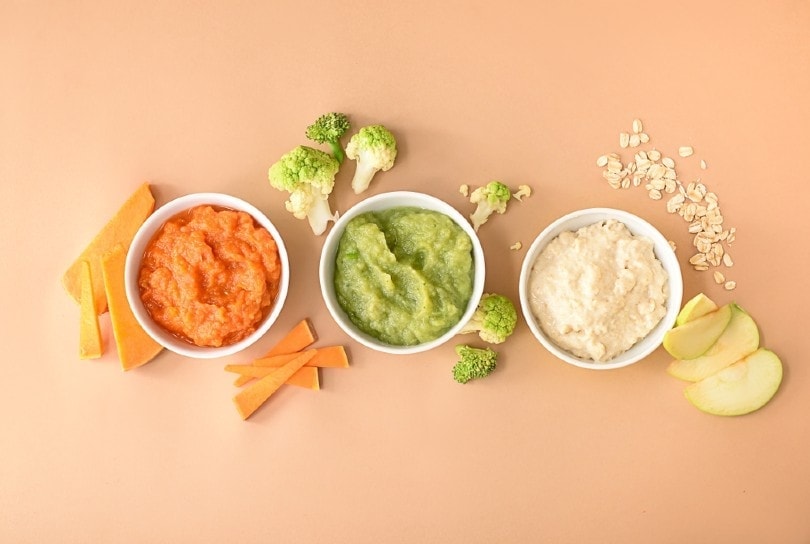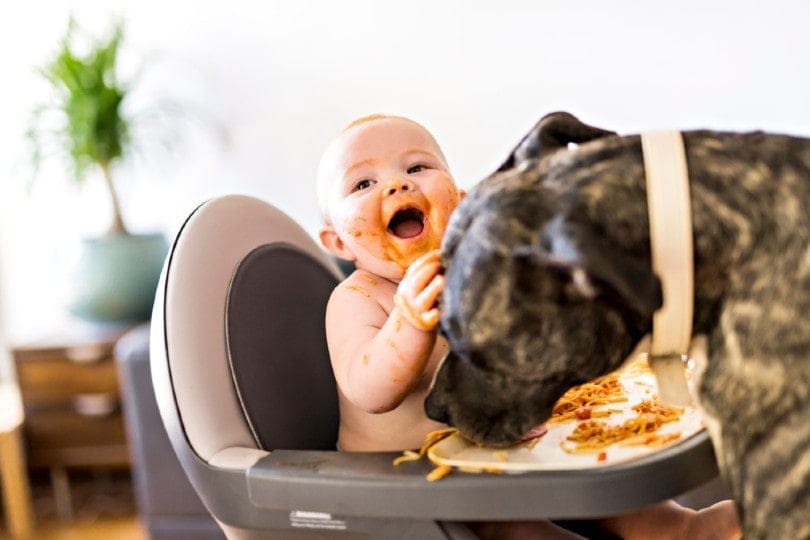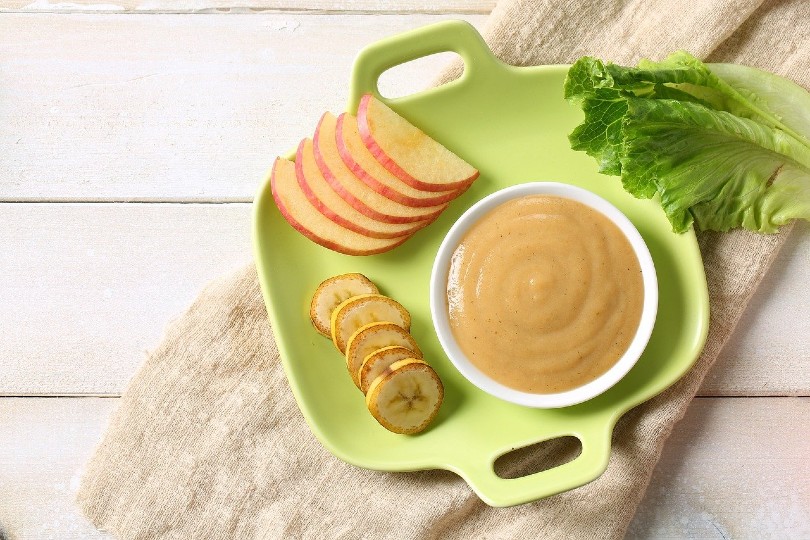Can Dogs Eat Baby Food? Facts & Safety Guide

Updated on

Most dogs love eating anything and everything, so if you have a baby at home and are just starting to wean them on solid foods, you might find your dog hanging around the table at dinner time.
Baby food, especially meat-based versions, smells strong, so your dog will probably come and see what that delicious smell is. But is it okay for your dog to eat leftover baby food? Baby food is safe for dogs, but you should only feed it in small quantities. It can be a good choice for a few health conditions. Let’s take a closer look at the pros and cons of feeding baby food to your dog.
Why Is Baby Food Good for Dogs?
Before feeding baby food to your dog, speak to your veterinarian to get the all-clear for your dog and any particular health concerns they may have. Feeding baby food is not a substitute for a balanced diet. While it can help increase palatability or hide medications, it shouldn’t be considered a long-term solution.
Your dog’s primary food should be certified by the AAFCO as “complete and balanced” for their life stage. That way, you know they’re getting all the nutrients, vitamins, and minerals they need, and baby food is just an extra!
Baby food isn’t exactly “good” for dogs, and there’s nothing in it, nutritionally speaking, that they can’t get from their regular dog food. However, it can be helpful in specific scenarios, such as encouraging a fussy dog to eat or to help them take their medication.

Book a Veterinarian Check-up
If you’re feeding baby food to your dog to encourage them to eat their dinner, we recommend booking an appointment with your veterinarian if your dog is still off their food for more than two days. It could be a sign that they have a medical condition that must be examined, so it’s best to play it safe and speak to your veterinarian.
- Vomiting
- Refusing to drink
- Lack of appetite
- Lethargy
- Refusing to eat
- Diarrhea or constipation for 2 or more days
Which Baby Food Is Best for Dogs?
Most vets will recommend meat-based or vegetable Stage II baby foods. Adding a few jars to your first-aid kit can be helpful, so if your dog needs medication or has a gastrointestinal upset, you have some on hand.
- Chicken
- Lamb
- Beef
- Turkey
- Sweet potato
- Pumpkin
- Banana
It’s best to select a baby food that contains one flavor only. Mixes often have added ingredients you might not want to feed your dog. Always check the ingredients and select a brand with the lowest salt content possible. Avoid foods that contain onions or garlic.

Good Things About Baby Food
Meat-based baby foods have a strong smell that can mask medications or tempt a fussy eater to finish dinner. The high fiber content of pumpkin baby food can help solve gastrointestinal issues like diarrhea or constipation.
Bad Things About Baby Food
Avoid any baby foods that contain a blend of flavors, like “chicken roast dinner,” for example. These can often contain hidden ingredients, like onion or garlic powder, that can be harmful for your dog to eat.
Try to avoid feeding your dog baby food regularly. You may find that your dog loves the flavor so much they refuse to eat their regular food! Instead of relying on baby food for the long term, it’s better to consider switching dog food brands and finding a new flavor that your dog prefers.
If you feed dry kibble to your dog, perhaps they would prefer a more palatable wet dog food in gravy. There are so many brands to choose from, and you shouldn’t have trouble finding one that your fussy dog will love!

How to Feed Baby Food to Your Dog
Baby food should only be fed to your dog occasionally and shouldn’t make up a regular part of their diet. If your dog isn’t eating their dinner and you need something that smells good and tastes even better, you might find that baby food will get your dog to eat. You can also hide medication in baby food.
Some dogs will eat a tablet hidden in a spoonful of baby food, or if the medication is liquid, you can blend it into the baby food and feed it that way. Some “fear-free” veterinary clinics use treats like a small amount of baby food to keep your dog calm and distracted while they get an injection or examination.
If you’re feeding pumpkin baby food to help a gastrointestinal issue, 1 tablespoon per serving for a large dog will be sufficient. Around 1-2 teaspoons for a smaller dog will be enough, depending on your dog’s size. Feeding any more than that could make your dog’s gastrointestinal signs worse rather than better.
Warming the baby food to body temperature (but not hotter) can increase palatability even further, and it seems to tempt some dogs to eat. Always refrigerate unused baby food and discard it after 24 hours or per the manufacturer’s instructions.
As with any new food, only feed a small amount to start with. Keep an eye on your dog for signs of allergic reactions, unusual bowel movements, or any other signs that they aren’t tolerating the food as well as they could be.

Final Thoughts
Baby food is safe for dogs and can be valuable to have on hand. It can encourage an ill dog to eat on a short-term basis or be used to hide medications.
High-quality dog food should always make up most of your dog’s daily rations. It’s nutritionally balanced to meet your dog’s needs, while baby food is formulated for babies!
If you’re tempted to keep feeding baby food to your dog to encourage them to eat, consider switching their dog food to a different brand that they may find more palatable. It’s vital to speak to your veterinarian if you have any concerns about your dog’s eating habits or are having trouble giving them their medication.
See also:
Feature Image Credit: MaraZe, Shutterstock












